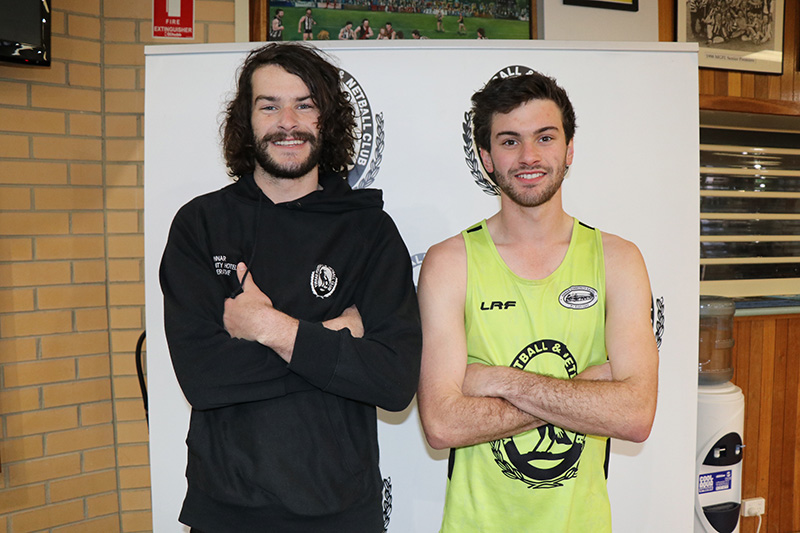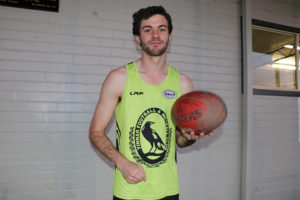
Finding bonds on the field, cementing them off it
The local football club is one of the main hubs of a country town. Text, photos and audio by Hunter J. Thompson. Video by Minka Curr.
Stalwarts tell stories of players from rival teams angling to join Yinnar’s football team, the club seemingly enjoying such a reputation that it doesn’t need to fish or poach for talent.
Sometimes this means aspiring recruits turn their backs on money to play elsewhere. The message from the wannabe players: “I just want to play for Yinnar.”
Besides finishing second on the ladder after the home and away games this season, playing in a grand final last year, and winning it all in 2015, the main drawcard of the club? The consensus seems to be that it is less about the glory than it is about really good people.
Speedy half-back flanker Dean Linton joined the club in the under 10s, playing thirds footy at 16, slowly moving through the ranks to now be an integral part of the seniors’ team.

It’s all about the teammates
On the day we join him, at the business end of the 2018 season, he had spent most of it working as a carpenter at the Traralgon Caravan Park, about a 20 minutes’ drive east on the freeway.
Most of his work is industrial, whether it be at the RSL, schools, or as on this particular day, at the caravan park. He’s happy to report there is no shortage of work, and he often finds himself pitching in as a painter alongside his brother Luke, or helping out at other work sites.
By the time he knocks off and drives back to Yinnar, it’s a dark, raw Tuesday evening and the second last training session before Yinnar’s eventual Preliminary Final win against Yallourn-Yallourn North. The result – a spot in the Mid-Gippsland Football League Grand Final.
Although the day is pretty much spent, training is the highlight. The air is brisk, the lights are on, and the clapping of football boots on asphalt echoes around the grandstand as the players run out.
Upon entering the change-rooms, the smell of Deep Heat cream burns the nostrils. Along the wall, a line of stand-up tin ice baths. These get filled with cold water and ice, waiting for players and their sore bodies after games – nightmare stuff.
The club slogan – ‘’ONE CLUB, ONE GOAL, BRUTALLY BEST’’ – shouts out in black, bold writing on one of the four walls that would have thousands of stories to tell.

Inside the club
Dean, 22, sees himself mostly as an outside player, acknowledging that he is one of the skinnier blokes at the club. In recent times, he has been assigned the task of minding the opposition’s quickest and most dangerous forward – a task he relishes.
Brother Luke, 24, is plainly the elder, taller and more mature in his face. The siblings have their differences – Luke wears his dark hair long, Dean sports a more measured trim – but their shy, shared laughter and constant cracking of jokes betrays a strong connection.
Around the club, Luke gets ‘’Bobby’’, for zero reason that can be found. Dean gets ‘‘Spindles’’, in reference to former AFL player Jarrod Grant.
When asked who the better player is, Dean gives the diplomatic response – “we’re different”. He quickly follows that Luke has indeed been playing very well and would be the better player. “I don’t reckon I’d tell him that”.
Until recently, their uncle Peter had spent more than two decades as Yinnar club coach and president.
The Magpies are a proud sporting organisation, a central part of the community, as in so many country towns, with a tradition of fielding football teams for the boys and netball teams for the girls.
The revolution that is women’s football is yet to hit Yinnar. The league currently doesn’t include any teams for the girls, despite interest from some of the locals.
“I think we’d probably struggle to get the numbers,” says senior football coach Jamie Aitken. “But there are girls within the community who play netball on the weekend who play footy at another club on a Sunday.”
The rules of the club portray its core principles. These include the requirement of senior players to arrive early to watch the preceding game, and then to stick around after games to have a drink with the opposition.
Scrolling through its website you’ll find the aims of the club. The word ‘‘community’’ is littered through these objectives, a clear indication of its values.
It’s more than just lip service, says club legend and 400 netball game veteran Sonia Williams, who is widely described as the “heart of the club”.
Williams, 46, has represented the club since 1991. She sees it as a friendship group and a type of security. “It’s a way to be involved in the community,” she says.
When we visit, six Magpies teams have advanced through to grand final weekend including a senior netball team.
“Pretty proud for a town our size to get that many teams through,” says Williams. “They’ll celebrate Saturday night whether they win or lose.”
Population decline in recent years in rural areas has led to widespread mergers and closures of country football teams and leagues, and it is beginning to tell here too.
Coach Aitken says the only chink in the health of the club is the lack of junior numbers at under 16s and 18s level. “That’s a trend locally,” he says.
According to Aitken there is a retention issue in country footy, but due to an excellent junior program, not necessarily at Yinnar.
“The problem is there’s not much work around,” he says. “Kids leave for work or university and head to the city.
“We’ve been pretty lucky that some of them come back and play footy on the weekends. Some even come back and train on the Thursdays. The commitment to their local community is strong.”
Of the 10 clubs in the league only five have the numbers to field a thirds and fourths team. “Definitely a decrease in the community, but within our club it’s pretty strong,” he says.

Football is a central part of the community
After the nearby Hazelwood Power Station closed down last year, many people had to move town to find new employment, says Dean.
His father Greg was one of the hundreds of local workers made redundant by the shutdown. Luckily, he was only without work for a month before getting a job at Loy Yang Power Station through a connection from the local cricket club.
Many others haven’t been as lucky. A friend’s father still hasn’t found new employment after 20 years at the Hazelwood plant.
Greg previously worked at the general store for 25 years after inheriting both that and the post office from his father. Dean’s mother Leanne has worked at the Churchill chemist, a 15-minute drive away, for 20 years.
‘‘Spindles’’ envisages raising a family of his own in Yinnar, much like his parents before him, and keeping the Lintons close. Luke, similarly wants to stay in the area, perhaps moving to nearby Traralgon to be close to work and the best nightspots.
Despite being voters in one of the state’s most marginal state electorates in Morwell, Dean and his family don’t take much interest in politics. Like lots of people his age, he gets most of his information about issues like climate change – which has, through the fading of the coal industry, already impacted his life and community – through documentaries on Netflix.
During the winter months, life for him is all about Saturdays. Long weeks of hard work and any problems in life are washed away during those two-and-a-half hours on the weekends.
The seniors’ football grand final is likely to draw the attendance of the entire town. The row of decorative iron kangaroos leaping down main street sporting black and white scarves and beanies gives you the sense of excitement.
“If the club’s happy, the town is happy,” says Dean.
